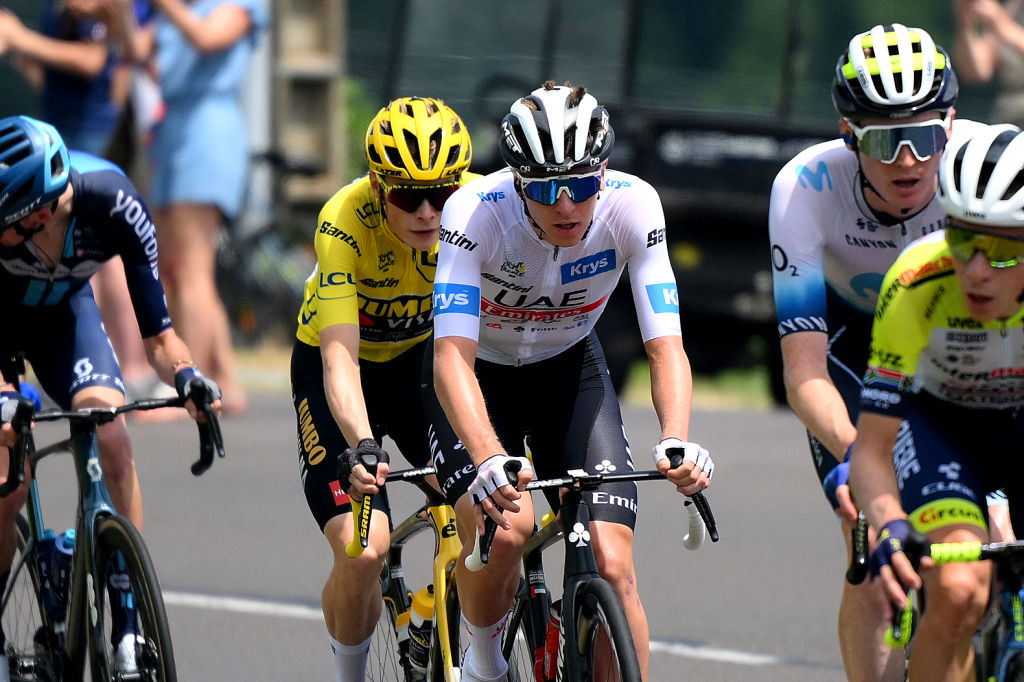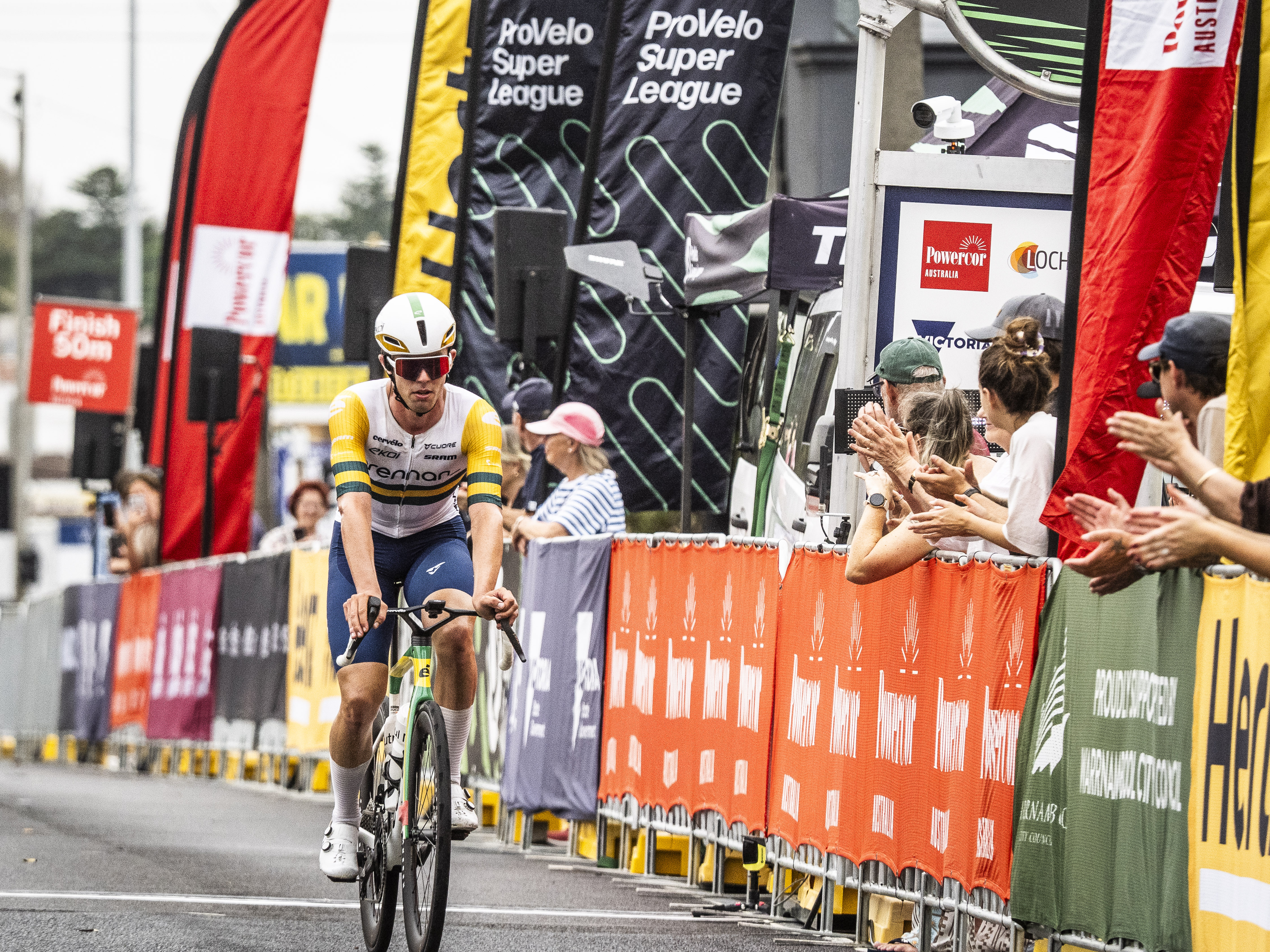'It was all in bits' on Tour de France stage 10 as Vingegaard, Pogacar battle sizzles
No post-rest-day respite for peloton on intense day in the Massif Central

The latest race content, interviews, features, reviews and expert buying guides, direct to your inbox!
You are now subscribed
Your newsletter sign-up was successful
"Every Tour has a day like this," Wout van Aert said after he had finished cooling down outside the Jumbo-Visma team bus in Issoire after stage 10. Maybe, but it's hard to shake off the impression that they happen on the Tour de France with rather more regularity in the supersonic era of Jonas Vingegaard and Tadej Pogačar.
There was a time when the Tour's forays through the Massif Central almost inevitably played out dutifully as transition stages. ONCE's all-out offensive against Miguel Indurain on the road to Mende in 1995 was so dramatic because of its rarity. For most of his five-year reign as Tour champion, Indurain could navigate days such as these in relative tranquillity. Men like Tony Rominger were never so crass as to try to get in the early break.
In the Tour like in Ashes cricket, the old, unwritten rules no longer apply in the 21st century. The sight of riders furiously warming up outside their team buses in Vulcania on Tuesday morning, despite temperatures of more than 30° Celsius, said as much.
After the Tour de France's first rest day, there would be no gentle return to duty here, particularly with the race going up the short, sharp Col de Moréno in the opening kilometres.
The warp factor of the opening exchanges increased exponentially, however, when Pogačar took it upon himself to join the early attacking and the yellow jersey Vingegaard immediately followed.
Whenever the pair attack in the mountains, the inexorable logic of their power-to-weight ratios carries them clear of everybody else instantaneously, and nobody else even thinks of lifting the velvet rope to follow them into the VIP area.
When a rider like Pogačar accelerates in the opening kilometres on a day like Tuesday, however, it's more like cycling's equivalent of shouting 'fire!' in a cinema. Suddenly everybody is scrambling to follow them out the door.
The latest race content, interviews, features, reviews and expert buying guides, direct to your inbox!
It was full gas racing: who is there, is there. At that point, I didn't care who was there anymore
Tadej Pogačar
Pogačar and Vingegaard's high-octane marking was one of the key drivers of the early move of 22 riders that formed after the Moréno, and the tension infused by that initial skirmish percolated for most of the day. Everybody, it seemed, wanted in on the action or was at least afraid of getting left behind.
"It was a very intense start. A lot of jumping from basically everyone I would say," was Vingegaard's understated assessment. "There were a lot of different scenarios, different breakaways that went and then it didn't work out, it came back. Then eventually I think it was a bit later but then the break went."
Fred Wright (Bahrain Victorious) reached for a stronger adjective. "That start was horrendous. There was one point where Pogačar and Vingegaard were in a group up the road," he said of a day where the intensity of the race did not concede the conditions. "We had about ten bidons, maybe more, you lose count…so we use ice gels, lots of ice, all the works."
Van Aert was dropped at one point, while David Gaudu was also among those distanced, forced into a lengthy and frantic chase across rugged terrain. The winning break didn't form until midway through the stage, and even then, it took considerably more time for the escapees to prise their way fully clear of the peloton.
Puzzling
EF Education-EasyPost directeur sportif Tom Southam had a roadside view of the carnage in the opening kilometres of the stage. He had driven ahead of the race to help offset the effects of the extreme heat, which was already a concern long before Pogačar turned up the temperature.
"It was so, so hard. I went up the road early to do an extra bidon point and the start was…it was all in bits. There was no holding back whatsoever," Southam told Cyclingnews.
Esteban Chaves made the break for EF and later went clear alone on the climb to Saint-Victor-la-Rivière before placing fifth on the stage. Southam, however, was perplexed by long it had taken for the break of the day to stick. The presence of stage winner Pello Bilbao (Bahrain Victorious) – now fifth overall after gaining almost three minutes – was perhaps only a partial explanation.
"There were a lot of things I didn't understand about today. I mean teams are totally entitled to do their own things, but you kind of think you've got a grasp on what's happened, and then all of a sudden one team starts pulling and [you think] 'Why did that happen, why didn't you let the break go?" Southam said.
"Even at the end they were riding so hard behind the break, it was like… a bit puzzling. But that's the Tour, man, those secondary conditions start to establish themselves in the second week, the team classification or the top ten."
Although there was a very relative détente among the GC men in the final hour of racing, the bunch still came home less than three minutes down on the break. Despite taking in five classified ascents and some 3,000m of total climbing across its 167km, the stage was run off at an average speed of 43.1kph, thanks in no small part to the tone set by Pogačar and Vingegaard's presence among the early attacks.
"There was a lot of jumping at the start and I can't remember exactly how we ended up in the break, but we ended up in the break with me and Sepp [Kuss]," Vingegaard said after he rolled home in the main bunch with Pogačar, still with a 17-second lead in the overall standings. "UAE had Pogačar, [Adam] Yates [Rafal] Majka and maybe one more, I think. Maybe it wasn't the ideal situation for us, but we got brought back and that was fine with us."
Pogačar claimed he had been surprised by the ferocity of the stage, as though unaware that the flapping of his wings generally tends to trigger a hurricane. "Honestly, I thought it was going to be a little bit easier, but I don't have enough experience," said the two-time Tour champion and winner of three different Monuments. "It was one of the toughest stages in the Tour so far, so I'm glad it's over."
The Slovenian insisted he had been aware that riders of the calibre of Gaudu and Romain Bardet had been distanced significantly amid the early flurry of attacks. All Pogačar saw, it seems, was the road ahead. The relentlessness of the modern Tour in microcosm.
"I didn't even know they were dropped," Pogačar said. "It was full gas racing: who is there, is there. At that point, I didn't care who was there anymore."

Barry Ryan was Head of Features at Cyclingnews. He has covered professional cycling since 2010, reporting from the Tour de France, Giro d’Italia and events from Argentina to Japan. His writing has appeared in The Independent, Procycling and Cycling Plus. He is the author of The Ascent: Sean Kelly, Stephen Roche and the Rise of Irish Cycling’s Golden Generation, published by Gill Books.
